Are you seeking one-on-one college counseling and/or essay support? Limited spots are now available. Click here to learn more.

15 Best Creative Writing MFA Programs in 2024
May 15, 2024
Whether you studied at a top creative writing university or are a high school dropout who will one day become a bestselling author , you may be considering an MFA in Creative Writing. But is a writing MFA genuinely worth the time and potential costs? How do you know which program will best nurture your writing? If you’re considering an MFA, this article walks you through the best full-time, low residency, and online Creative Writing MFA programs in the United States.
What are the best Creative Writing MFA programs?
Before we get into the meat and potatoes of this article, let’s start with the basics. What is an MFA, anyway?
A Master of Fine Arts (MFA) is a graduate degree that usually takes from two to three years to complete. Applications typically require a sample portfolio, usually 10-20 pages (and sometimes up to 30-40) of your best writing. Moreover, you can receive an MFA in a particular genre, such as Fiction or Poetry, or more broadly in Creative Writing. However, if you take the latter approach, you often have the opportunity to specialize in a single genre.
Wondering what actually goes on in a creative writing MFA beyond inspiring award-winning books and internet memes ? You enroll in workshops where you get feedback on your creative writing from your peers and a faculty member. You enroll in seminars where you get a foundation of theory and techniques. Then, you finish the degree with a thesis project. Thesis projects are typically a body of polished, publishable-quality creative work in your genre—fiction, nonfiction, or poetry.
Why should I get an MFA in Creative Writing?
You don’t need an MFA to be a writer. Just look at Nobel Prize winner Toni Morrison or bestselling novelist Emily St. John Mandel.
Nonetheless, there are plenty of reasons you might still want to get a creative writing MFA. The first is, unfortunately, prestige. An MFA from a top program can help you stand out in a notoriously competitive industry to be published.
The second reason: time. Many MFA programs give you protected writing time, deadlines, and maybe even a (dainty) salary.
Third, an MFA in Creative Writing is a terminal degree. This means that this degree allows you to teach writing at the university level, especially after you publish a book.
Fourth: resources. MFA programs are often staffed by brilliant, award-winning writers; offer lecture series, volunteer opportunities, and teaching positions; and run their own (usually prestigious) literary magazines. Such resources provide you with the knowledge and insight you’ll need to navigate the literary and publishing world on your own post-graduation.
But above all, the biggest reason to pursue an MFA is the community it brings you. You get to meet other writers—and share feedback, advice, and moral support—in relationships that can last for decades.
Types of Creative Writing MFA Programs
Here are the different types of programs to consider, depending on your needs:
Fully-Funded Full-Time Programs
These programs offer full-tuition scholarships and sweeten the deal by actually paying you to attend them.
- Pros: You’re paid to write (and teach).
- Cons: Uprooting your entire life to move somewhere possibly very cold.
Full-Time MFA Programs
These programs include attending in-person classes and paying tuition (though many offer need-based and merit scholarships).
- Pros: Lots of top-notch non-funded programs have more assets to attract world-class faculty and guests.
- Cons: It’s an investment that might not pay itself back.
Low-Residency MFA Programs
Low-residency programs usually meet biannually for short sessions. They also offer one-on-one support throughout the year. These MFAs are more independent, preparing you for what the writing life is actually like.
- Pros: No major life changes required. Cons: Less time dedicated to writing and less time to build relationships.
Online MFA Programs
Held 100% online. These programs have high acceptance rates and no residency requirement. That means zero travel or moving expenses.
- Pros: No major life changes required.
- Cons: These MFAs have less name recognition.
The Top 15 Creative Writing MFA Programs Ranked by Category
The following programs are selected for their balance of high funding, impressive return on investment, stellar faculty, major journal publications , and impressive alums.
FULLY FUNDED MFA PROGRAMS
1) johns hopkins university , mfa in fiction/poetry.
This two-year program offers an incredibly generous funding package: $39,000 teaching fellowships each year. Not to mention, it offers that sweet, sweet health insurance, mind-boggling faculty, and the option to apply for a lecture position after graduation. Many grads publish their first book within three years (nice). No nonfiction MFA (boo).
- Location: Baltimore, MD
- Incoming class size: 8 students (4 per genre)
- Admissions rate: 4-8%
- Alumni: Chimamanda Adichie, Jeffrey Blitz, Wes Craven, Louise Erdrich, Porochista Khakpour, Phillis Levin, ZZ Packer, Tom Sleigh, Elizabeth Spires, Rosanna Warren
2) University of Texas, James Michener Center
The only MFA that offers full and equal funding for every writer. It’s three years long, offers a generous yearly stipend of $30k, and provides full tuition plus a health insurance stipend. Fiction, poetry, playwriting, and screenwriting concentrations are available. The Michener Center is also unique because you study a primary genre and a secondary genre, and also get $4,000 for the summer.
- Location : Austin, TX
- Incoming class size : 12 students
- Acceptance rate: a bone-chilling less-than-1% in fiction; 2-3% in other genres
- Alumni: Fiona McFarlane, Brian McGreevy, Karan Mahajan, Alix Ohlin, Kevin Powers, Lara Prescott, Roger Reeves, Maria Reva, Domenica Ruta, Sam Sax, Joseph Skibell, Dominic Smith
3) University of Iowa
The Iowa Writers’ Workshop is a 2-year program on a residency model for fiction and poetry. This means there are low requirements, and lots of time to write groundbreaking novels or play pool at the local bar. All students receive full funding, including tuition, a living stipend, and subsidized health insurance. The Translation MFA , co-founded by Gayatri Chakravorti Spivak, is also two years long but with more intensive coursework. The Nonfiction Writing Program is a prestigious three-year MFA program and is also intensive.
- Incoming class size: 25 each for poetry and fiction; 10-12 for nonfiction and translation.
- Acceptance rate: 2.7-3.7%
- Fantastic Alumni: Raymond Carver, Flannery O’Connor, Sandra Cisneros, Joy Harjo, Garth Greenwell, Kiley Reid, Brandon Taylor, Eula Biss, Yiyun Li, Jennifer Croft
Best MFA Creative Writing Programs (Continued)
4) university of michigan.
Anne Carson famously lives in Ann Arbor, as do the MFA students in UMichigan’s Helen Zell Writers’ Program. This is a big university town, which is less damaging to your social life. Plus, there’s lots to do when you have a $25,000 stipend, summer funding, and health care.
This is a 2-3-year program in either fiction or poetry, with an impressive reputation. They also have a demonstrated commitment to “ push back against the darkness of intolerance and injustice ” and have outreach programs in the community.
- Location: Ann Arbor, MI
- Incoming class size: 18 (9 in each genre)
- Acceptance rate: 2%
- Alumni: Brit Bennett, Vievee Francis, Airea D. Matthews, Celeste Ng, Chigozie Obioma, Jia Tolentino, Jesmyn Ward
5) Brown University
Brown offers an edgy, well-funded program in a place that only occasionally dips into arctic temperatures. All students are fully funded for 2 years, which includes tuition remission and a $32k yearly stipend. Students also get summer funding and—you guessed it—that sweet, sweet health insurance.
In the Brown Literary Arts MFA, students take only one workshop and one elective per semester. It’s also the only program in the country to feature a Digital/Cross Disciplinary Track. Fiction and Poetry Tracks are offered as well.
- Location: Providence, RI
- Incoming class size: 12-13
- Acceptance rate: “highly selective”
- Alumni: Edwidge Danticat, Jaimy Gordon, Gayl Jones, Ben Lerner, Joanna Scott, Kevin Young, Ottessa Moshfegh
6) University of Arizona
This 3-year program with fiction, poetry, and nonfiction tracks has many attractive qualities. It’s in “ the lushest desert in the world, ” and was recently ranked #4 in creative writing programs, and #2 in Nonfiction. You can take classes in multiple genres, and in fact, are encouraged to do so. Plus, Arizona’s dry heat is good for arthritis.
This notoriously supportive program is fully funded. Moreover, teaching assistantships that provide a salary, health insurance, and tuition waiver are offered to all students. Tucson is home to a hopping literary scene, so it’s also possible to volunteer at multiple literary organizations and even do supported research at the US-Mexico Border.
- Location: Tucson, AZ
- Incoming class size: usually 6
- Acceptance rate: 1.2% (a refreshingly specific number after Brown’s evasiveness)
- Alumni: Francisco Cantú, Jos Charles, Tony Hoagland, Nancy Mairs, Richard Russo, Richard Siken, Aisha Sabatini Sloan, David Foster Wallace
7) Arizona State University
With concentrations in fiction and poetry, Arizona State is a three-year funded program in arthritis-friendly dry heat. It offers small class sizes, individual mentorships, and one of the most impressive faculty rosters in the game. Moreover, it encourages cross-genre study.
Funding-wise, everyone has the option to take on a teaching assistantship position, which provides a tuition waiver, health insurance, and a yearly stipend of $25k. Other opportunities for financial support exist as well.
- Location: Tempe, AZ
- Incoming class size: 8-10
- Acceptance rate: 3% (sigh)
- Alumni: Tayari Jones, Venita Blackburn, Dorothy Chan, Adrienne Celt, Dana Diehl, Matthew Gavin Frank, Caitlin Horrocks, Allegra Hyde, Hugh Martin, Bonnie Nadzam
FULL-RESIDENCY MFAS (UNFUNDED)
8) new york university.
This two-year program is in New York City, meaning it comes with close access to literary opportunities and hot dogs. NYU also has one of the most accomplished faculty lists anywhere. Students have large cohorts (more potential friends!) and have a penchant for winning top literary prizes. Concentrations in poetry, fiction, and creative nonfiction are available.
- Location: New York, NY
- Incoming class size: ~60; 20-30 students accepted for each genre
- Acceptance rate: 6-9%
- Alumni: Nick Flynn, Nell Freudenberger, Aracelis Girmay, Mitchell S. Jackson, Tyehimba Jess, John Keene, Raven Leilani, Robin Coste Lewis, Ada Limón, Ocean Vuong
9) Columbia University
Another 2-3 year private MFA program with drool-worthy permanent and visiting faculty. Columbia offers courses in fiction, poetry, translation, and nonfiction. Beyond the Ivy League education, Columbia offers close access to agents, and its students have a high record of bestsellers. Finally, teaching positions and fellowships are available to help offset the high tuition.
- Incoming class size: 110
- Acceptance rate: not publicized (boo)
- Alumni: Alexandra Kleeman, Rachel Kushner, Claudia Rankine, Rick Moody, Sigrid Nunez, Tracy K. Smith, Emma Cline, Adam Wilson, Marie Howe, Mary Jo Bang
10) Sarah Lawrence
Sarah Lawrence offers a concentration in speculative fiction in addition to the average fiction, poetry, and nonfiction choices. Moreover, they encourage cross-genre exploration. With intimate class sizes, this program is unique because it offers biweekly one-on-one conferences with its stunning faculty. It also has a notoriously supportive atmosphere, and many teaching and funding opportunities are available.
- Location: Bronxville, NY
- Incoming class size: 30-40
- Acceptance rate: not publicized
- Alumni: Cynthia Cruz, Melissa Febos, T Kira Madden, Alex Dimitrov, Moncho Alvarado
LOW RESIDENCY
11) bennington college.
This two-year program boasts truly stellar faculty, and meets twice a year for ten days in January and June. It’s like a biannual vacation in beautiful Vermont, plus mentorship by a famous writer. The rest of the time, you’ll be spending approximately 25 hours per week on reading and writing assignments. Students have the option to concentrate in fiction, nonfiction, or poetry. Uniquely, they can also opt for a dual-genre focus.
The tuition is $23,468 per year, with scholarships available. Additionally, Bennington offers full-immersion teaching fellowships to MFA students, which are extremely rare in low-residency programs.
- Location: Bennington, VT
- Acceptance rate: 53%
- Incoming class: 25-35
- Alumni: Larissa Pham, Andrew Reiner, Lisa Johnson Mitchell, and others
12) Institute for American Indian Arts
This two-year program emphasizes Native American and First Nations writing. With truly amazing faculty and visiting writers, they offer a wide range of genres, including screenwriting, poetry, fiction, and nonfiction. In addition, each student is matched with a faculty mentor who works with them one-on-one throughout the semester.
Students attend two eight-day residencies each year, in January and July, in Santa Fe, New Mexico. At $12,000 in tuition a year, it boasts being “ one of the most affordable MFA programs in the country .”
- Location: Santa Fe, NM
- Incoming class size : 21
- Alumni: Tommy Orange, Dara Yen Elerath, Kathryn Wilder
13) Vermont College of Fine Arts
VCFA is the only graduate school on this list that focuses exclusively on the fine arts. Their MFA in Writing offers concentrations in fiction, poetry, and nonfiction; they also offer an MFA in Literary Translation and one of the few MFAs in Writing for Children and Young Adults . Students meet twice a year for nine days, in January and July, either in-person or online. Here, they receive one-on-one mentorship that continues for the rest of the semester. You can also do many travel residencies in exciting (and warm) places like Cozumel.
VCFA boasts amazing faculty and visiting writers, with individualized study options and plenty of one-on-one time. Tuition for the full two-year program is approximately $54k.
- Location : Various; 2024/25 residencies are in Colorado and California
- Incoming class size: 18-25
- Acceptance rate: 63%
- Alumnx: Lauren Markham, Mary-Kim Arnold, Cassie Beasley, Kate Beasley, Julie Berry, Bridget Birdsall, Gwenda Bond, Pablo Cartaya
ONLINE MFAS
14) university of texas at el paso.
UTEP is considered the best online MFA program, and features award-winning faculty from across the globe. Accordingly, this program is geared toward serious writers who want to pursue teaching and/or publishing. Intensive workshops allow submissions in Spanish and/or English, and genres include poetry and fiction.
No residencies are required, but an optional opportunity to connect in person is available every year. This three-year program costs about $25-30k total, depending on whether you are an in-state or out-of-state resident.
- Location: El Paso, TX
- Acceptance rate: “highly competitive”
- Alumni: Watch alumni testimonies here
15) Bay Path University
This 2-year online, no-residency program is dedicated entirely to nonfiction. Featuring a supportive, diverse community, Bay Path offers small class sizes, close mentorship, and an optional yearly field trip to Ireland.
There are many tracks, including publishing, narrative medicine, and teaching creative writing. Moreover, core courses include memoir, narrative journalism, food/travel writing, and the personal essay. Tuition is approximately $31,000 for the entire program, with scholarships available.
- Location: Longmeadow, MA
- Incoming class size: 20
- Alumni: Read alumni testimonies here
Best MFA Creative Writing Programs — Final Thoughts
Whether you’re aiming for a fully funded, low residency, or completely online MFA program, there are plenty of incredible options available—all of which will sharpen your craft while immersing you in the vibrant literary arts community.
Hoping to prepare for your MFA in advance? You might consider checking out the following:
- Best English Programs
- Best Colleges for Creative Writing
- Writing Summer Programs
- Best Writing Competitions for High School Students
Inspired to start writing? Get your pencil ready:
- 100 Creative Writing Prompts
- 1 00 Tone Words to Express Mood in Your Writing
- 60 Senior Project Ideas
- Common App Essay Prompts
Best MFA Creative Writing Programs – References:
- https://www.pw.org/mfa
- The Creative Writing MFA Handbook: A Guide for Prospective Graduate Students , by Tom Kealey (A&C Black 2005)
- Graduate School Admissions
Julia Conrad
With a Bachelor of Arts in English and Italian from Wesleyan University as well as MFAs in both Nonfiction Writing and Literary Translation from the University of Iowa, Julia is an experienced writer, editor, educator, and a former Fulbright Fellow. Julia’s work has been featured in The Millions , Asymptote , and The Massachusetts Review , among other publications. To read more of her work, visit www.juliaconrad.net
- 2-Year Colleges
- Application Strategies
- Best Colleges by Major
- Best Colleges by State
- Big Picture
- Career & Personality Assessment
- College Essay
- College Search/Knowledge
- College Success
- Costs & Financial Aid
- Data Visualizations
- Dental School Admissions
- Extracurricular Activities
- High School Success
- High Schools
- Homeschool Resources
- Law School Admissions
- Medical School Admissions
- Navigating the Admissions Process
- Online Learning
- Outdoor Adventure
- Private High School Spotlight
- Research Programs
- Summer Program Spotlight
- Summer Programs
- Teacher Tools
- Test Prep Provider Spotlight
“Innovative and invaluable…use this book as your college lifeline.”
— Lynn O'Shaughnessy
Nationally Recognized College Expert
College Planning in Your Inbox
Join our information-packed monthly newsletter.
Jump to navigation Skip to content
Search form
- P&W on Facebook
- P&W on Twitter
- P&W on Instagram
Find details about every creative writing competition—including poetry contests, short story competitions, essay contests, awards for novels, grants for translators, and more—that we’ve published in the Grants & Awards section of Poets & Writers Magazine during the past year. We carefully review the practices and policies of each contest before including it in the Writing Contests database, the most trusted resource for legitimate writing contests available anywhere.
Find a home for your poems, stories, essays, and reviews by researching the publications vetted by our editorial staff. In the Literary Magazines database you’ll find editorial policies, submission guidelines, contact information—everything you need to know before submitting your work to the publications that share your vision for your work.
Whether you’re pursuing the publication of your first book or your fifth, use the Small Presses database to research potential publishers, including submission guidelines, tips from the editors, contact information, and more.
Research more than one hundred agents who represent poets, fiction writers, and creative nonfiction writers, plus details about the kinds of books they’re interested in representing, their clients, and the best way to contact them.
Every week a new publishing professional shares advice, anecdotes, insights, and new ways of thinking about writing and the business of books.
Find publishers ready to read your work now with our Open Reading Periods page, a continually updated resource listing all the literary magazines and small presses currently open for submissions.
Since our founding in 1970, Poets & Writers has served as an information clearinghouse of all matters related to writing. While the range of inquiries has been broad, common themes have emerged over time. Our Top Topics for Writers addresses the most popular and pressing issues, including literary agents, copyright, MFA programs, and self-publishing.
Our series of subject-based handbooks (PDF format; $4.99 each) provide information and advice from authors, literary agents, editors, and publishers. Now available: The Poets & Writers Guide to Publicity and Promotion, The Poets & Writers Guide to the Book Deal, The Poets & Writers Guide to Literary Agents, The Poets & Writers Guide to MFA Programs, and The Poets & Writers Guide to Writing Contests.
Find a home for your work by consulting our searchable databases of writing contests, literary magazines, small presses, literary agents, and more.

Poets & Writers lists readings, workshops, and other literary events held in cities across the country. Whether you are an author on book tour or the curator of a reading series, the Literary Events Calendar can help you find your audience.
Get the Word Out is a new publicity incubator for debut fiction writers and poets.
Research newspapers, magazines, websites, and other publications that consistently publish book reviews using the Review Outlets database, which includes information about publishing schedules, submission guidelines, fees, and more.
Well over ten thousand poets and writers maintain listings in this essential resource for writers interested in connecting with their peers, as well as editors, agents, and reading series coordinators looking for authors. Apply today to join the growing community of writers who stay in touch and informed using the Poets & Writers Directory.
Let the world know about your work by posting your events on our literary events calendar, apply to be included in our directory of writers, and more.

Find a writers group to join or create your own with Poets & Writers Groups. Everything you need to connect, communicate, and collaborate with other poets and writers—all in one place.
Find information about more than two hundred full- and low-residency programs in creative writing in our MFA Programs database, which includes details about deadlines, funding, class size, core faculty, and more. Also included is information about more than fifty MA and PhD programs.
Whether you are looking to meet up with fellow writers, agents, and editors, or trying to find the perfect environment to fuel your writing practice, the Conferences & Residencies is the essential resource for information about well over three hundred writing conferences, writers residencies, and literary festivals around the world.
Discover historical sites, independent bookstores, literary archives, writing centers, and writers spaces in cities across the country using the Literary Places database—the best starting point for any literary journey, whether it’s for research or inspiration.
Search for jobs in education, publishing, the arts, and more within our free, frequently updated job listings for writers and poets.
Establish new connections and enjoy the company of your peers using our searchable databases of MFA programs and writers retreats, apply to be included in our directory of writers, and more.

- Register for Classes
Each year the Readings & Workshops program provides support to hundreds of writers participating in literary readings and conducting writing workshops. Learn more about this program, our special events, projects, and supporters, and how to contact us.
The Maureen Egen Writers Exchange Award introduces emerging writers to the New York City literary community, providing them with a network for professional advancement.
Find information about how Poets & Writers provides support to hundreds of writers participating in literary readings and conducting writing workshops.

Bring the literary world to your door—at half the newsstand price. Available in print and digital editions, Poets & Writers Magazine is a must-have for writers who are serious about their craft.
View the contents and read select essays, articles, interviews, and profiles from the current issue of the award-winning Poets & Writers Magazine .
Read essays, articles, interviews, profiles, and other select content from Poets & Writers Magazine as well as Online Exclusives.
View the covers and contents of every issue of Poets & Writers Magazine , from the current edition all the way back to the first black-and-white issue in 1987.
Every day the editors of Poets & Writers Magazine scan the headlines—publishing reports, literary dispatches, academic announcements, and more—for all the news that creative writers need to know.
In our weekly series of craft essays, some of the best and brightest minds in contemporary literature explore their craft in compact form, articulating their thoughts about creative obsessions and curiosities in a working notebook of lessons about the art of writing.
The Time Is Now offers weekly writing prompts in poetry, fiction, and creative nonfiction to help you stay committed to your writing practice throughout the year. Sign up to get The Time Is Now, as well as a weekly book recommendation for guidance and inspiration, delivered to your inbox.
Every week a new author shares books, art, music, writing prompts, films—anything and everything—that has inspired and shaped the creative process.
Listen to original audio recordings of authors featured in Poets & Writers Magazine . Browse the archive of more than 400 author readings.
Ads in Poets & Writers Magazine and on pw.org are the best ways to reach a readership of serious poets and literary prose writers. Our audience trusts our editorial content and looks to it, and to relevant advertising, for information and guidance.
Start, renew, or give a subscription to Poets & Writers Magazine ; change your address; check your account; pay your bill; report a missed issue; contact us.
Peruse paid listings of writing contests, conferences, workshops, editing services, calls for submissions, and more.
Poets & Writers is pleased to provide free subscriptions to Poets & Writers Magazine to award-winning young writers and to high school creative writing teachers for use in their classrooms.
Read select articles from the award-winning magazine and consult the most comprehensive listing of literary grants and awards, deadlines, and prizewinners available in print.

- Subscribe Now
MFA Programs Contact Form
Help us keep this database current. If you have updated information on one of the programs listed in the MFA database, let us know.
MFA Programs Database
- Help Keep This Database Current
Our MFA database includes essential information about low- and full-residency graduate creative writing programs in the United States and other English-speaking countries to help you decide where to apply.
Adelphi University
Poetry: Jan-Henry Gray, Maya Marshall Prose: Katherine Hill, René Steinke, Igor Webb
Albertus Magnus College
Poetry: Paul Robichaud Fiction: Sarah Harris Wallman Nonfiction: Eric Schoeck
Alma College
Poetry: Leslie Contreras Schwartz, Jim Daniels, Benjamin Garcia Fiction: Karen E. Bender, Shonda Buchanan, Dhonielle Clayton, S. Kirk Walsh Creative Nonfiction: Anna Clark, Matthew Gavin Frank, Donald Quist, Robert Vivian
American University
Poetry: Kyle Dargan, David Keplinger Fiction: Dolen Perkins-Valdez, Stephanie Grant, Patricia Park Nonfiction: Rachel Louise Snyder
Antioch University
Poetry: Victoria Chang Prose: Lisa Locascio
Arcadia University
Poetry: Genevieve Betts, Michelle Reale Fiction: Stephanie Feldman, Joshua Isard, Tracey Levine, Eric Smith Literature: Matthew Heitzman, Christopher Varlack, Elizabeth Vogel, Jo Ann Weiner
Poetry: Genevieve Betts, Michelle Reale Fiction: Stephanie Feldman, Joshua Isard, Tracey Levine, Eric Smith
Arizona State University
Poetry: Sally Ball, Natalie Diaz, Alberto Álvaro Ríos, Safiya Sinclair Fiction: Matt Bell, Jenny Irish, Tara Ison, Mitchell Jackson, T. M. McNally Creative Nonfiction: Sarah Viren
Ashland University
Poetry: Dexter Booth, Marcelo Hernandez Castillo, Adam Gellings, Tess Taylor, Vanessa Angélica Villareal Fiction: Kirstin Chen, Edan Lepucki, Sarah Monette, Nayomi Munaweera, Vi Khi Nao, Naomi J. Williams, Kyle Winkler Nonfiction: Cass Donish, Kate Hopper, Lauren Markham, Thomas Mira y Lopez, Lisa Nikolidakis, Terese Mailhot
Augsburg University
Poetry: Michael Kleber-Diggs Fiction: Stephan Eirik Clark, Lindsay Starck Nonfiction: Anika Fajardo Playwriting: Carson Kreitzer, TyLie Shider, Sarah Myers Screenwriting: Stephan Eirik Clark, Andy Froemke
Ball State University
Poetry: Katy Didden, Mark Neely Fiction: Cathy Day, Sean Lovelace Nonfiction: Jill Christman, Silas Hansen Screenwriting: Rani Deighe Crowe, Matt Mullins
Bard College
Jess Arndt, Shiv Kotecha, Mirene Arsanios, Hannah Black, Trisha Low, Christoper Perez, Julian Talamantez Brolaski, Simone White
Bath Spa University
Poetry: Lucy English, Tim Liardet, John Strachan, Samantha Walton, Gerard Woodward Fiction: Gavin James Bower, Celia Brayfield, Alexia Casale, Anne-Marie Crowhurst, Lucy English, Nathan Filer, Aminatta Forna, Samantha Harvey, Philip Hensher, Steve Hollyman, Emma Hooper, Claire Kendal, Natasha Pulley, Kate Pullinger, C.J. Skuse, Gerard Woodward Nonfiction: Celia Brayfield, Lily Dunn, Richard Kerridge Scriptwriting: Robin Mukherjee
Poetry: Lucy English, Tim Liardet, Gerard Woodward Fiction: Gavin James Bower, Celia Brayfield, Anne-Marie Crowhurst, Nathan Filer, Aminatta Forna, Samantha Harvey, Philip Hensher, Claire Kendal, Natasha Pulley, Kate Pullinger, Gerard Woodward Nonfiction: Lily Dunn, Richard Kerridge
Bay Path University
Mel Allen, Leanna James Blackwell, Jennifer Baker, Melanie Brooks, María Luisa Arroyo Cruzado, Shahnaz Habib, Susan Ito, Karol Jackowski, Yi Shun Lai, Anna Mantzaris, Meredith O’Brien, Mick Powell, Suzanne Strempek Shea, Tommy Shea, Kate Whouley
Bennington Writing Seminars at Bennington College
Poetry: Jennifer Chang, Michael Dumanis, Randall Mann, Craig Morgan Teicher, Mark Wunderlich Fiction: Peter Cameron, Jai Chakrabarti, Stacey D’Erasmo, Monica Ferrell, Rebecca Makkai, Stuart Nadler, Téa Obreht, Moriel Rothman-Zecher, Katy Simpson Smith, Taymour Soomro Nonfiction: Garrard Conley, Sabrina Orah Mark, Spencer Reece, Lance Richardson, Shawna Kay Rodenberg, Hugh Ryan, Greg Wrenn
Binghamton University
Poetry: Tina Chang, Joseph Weil Fiction: Amir Ahmdi Arian, Thomas Glave, Leslie L. Heywood, Claire Luchette, Liz Rosenberg, Jaimee Wriston-Colbert, Alexi Zentner Nonfiction: Amir Ahmdi Arian, Leslie L. Heywood
Bluegrass Writers Studio at Eastern Kentucky University
Poetry: Julie Hensley, Young Smith Fiction: Julie Hensley, Robert Dean Johnson Nonfiction: Robert Dean Johnson, Evan J. Massey Playwriting: Young Smith
Boise State University
Poetry: Martin Corless-Smith, Sara Nicholson, Taryn Schwilling Fiction: Mitch Wieland (Director), Anna Caritj Creative Nonfiction: Chris Violet Eaton, Clyde Moneyhun
Boston University
Poetry: Andrea Cohen, Karl Kirchwey, Robert Pinsky Fiction: Leslie Epstein, Jennifer Haigh, Ha Jin
Boston University—MFA in Literary Translation
Odile Cazenave, Yuri Corrigan, Margaret Litvin, Christopher Maurer, Roberta Micaleff, Robert Pinsky (advising), Stephen Scully, Sassan Tabatabai, J. Keith Vincent, William Waters, Dennis Wuerthner, Cathy Yeh, Anna Zielinska-Elliott
Bowling Green State University
Poetry: Abigail Cloud, Amorak Huey, Sharona Muir, F. Dan Rzicznek, Larissa Szporluk, Jessica Zinz-Cheresnick Fiction: Joe Celizic, Lawrence Coates, Reema Rajbanshi, Michael Schulz
Brigham Young University
Poetry: Kimberly Johnson, Lance Larsen, Michael Lavers, John Talbot Fiction: Chris Crowe, Ann Dee Ellis, Spencer Hyde, Stephen Tuttle Nonfiction: Joey Franklin, Patrick Madden
Brooklyn College
Poetry: Julie Agoos, Ben Lerner Fiction: Joshua Henkin, Madeleine Thien Playwriting: Dennis A. Allen II, Elana Greenfield
Master of Fine Arts in Creative Writing The Write Stuff for Writers

Credit Hours
View Courses
100% online, 8-week courses
Transfer in up to 50% of the degree total
Grow Your Writing Passion into a Career with Liberty’s Online MFA in Creative Writing
Many people write creatively, but few hone their skills to develop their writing craft to its highest form. Even fewer learn the other skills it takes to become a successful writer, such as the steps needed to get a book published and into the hands of readers. Liberty’s 100% online Master of Fine Arts (MFA) in Creative Writing can help you develop your writing passion into a career so you can set your works free to impact culture and the world.
Employers in every industry need professionals who have strong writing skills, so you can be confident that your ability to write effectively can also help set you apart in your current career. With in-demand writing expertise and the ability to customize your degree with electives in literature or writing practice, Liberty’s online MFA in Creative Writing can help you achieve your professional writing goals.
Our online MFA in Creative Writing is designed to help you build on your writing skills with specific workshops dedicated to the craft of fiction, poetry, creative nonfiction, or screenwriting. With a work-in-progress approach to writing practice and mentorship from our faculty of experienced writers and scholars, you can learn the specific skills you need to make your writing stand out.

Ranked in the Top 10% of Niche.com’s Best Online Schools in America
- What Sets Us Apart?
- Private Nonprofit University
- 600+ Online Degrees
- No Standardized Testing for Admission
- Transfer in up to 75% of an Undergrad Degree
- Transfer in up to 50% of a Grad/Doctoral Degree
Why Choose Liberty’s MFA in Creative Writing?
Our online MFA in Creative Writing is mainly offered in an 8-week course format, and our tuition rate for graduate programs hasn’t increased in 9 years. Through our program, you can study the writing process and develop your creative skills through workshops with experienced writing professionals. With our flexible format, you can grow in your creative writing while continuing to do what is important to you.
As a terminal degree, the online MFA in Creative Writing can also help you pursue opportunities to teach writing at the K-12 or college level. You will gain comprehensive and in-depth exposure to writing, literature, publishing, and many other professional writing skills that you can pass on to students. Partner with the Liberty family and learn under faculty who have spent years in the field you love. Your career in professional writing starts here.
What Will You Study in Our MFA in Creative Writing?
The MFA in Creative Writing program is designed to help you become an excellent creative writer across the genres of creative fiction, nonfiction, screenwriting, and poetry. You can learn how to produce aesthetically and culturally engaged creative works while gaining professional knowledge and practice. You will also study foundational contemporary literature so that you have a background in studying important works to draw on for your writing.
To help you in your professional writing, you will also study many essential skills in editing, layout, and the business of publishing so that you can best position yourself for success in the market. Through your creative writing courses and workshops, you can develop your craft so that you will be ready for your thesis project.
Here are a few examples of the skills Liberty’s MFA in Creative Writing can help you master:
- Marketing your projects and pursuing new writing opportunities
- Organizing writing and adapting it to different types of writing
- Tailoring writing to specific audiences and markets
- Understanding what makes art effective, compelling, and impactful
- Writing compelling stories that engage readers
Potential Career Opportunities
- Book and magazine writer
- Business communications specialist
- Creative writing instructor
- Publications editor
- Screenwriter
- Website copy editor and writer
- Writing manager
Featured Courses
- ENGL 600 – Editing, Layout, and Publishing
- ENGL 601 – Writing as Cultural Engagement
- ENGL 603 – Literary Theory and Practice
- WRIT 610 – Writing Fiction
Degree Information
- This program falls under the College of Arts and Sciences .
- View the Graduate Arts and Sciences Course Guides (login required).
- Download and review the Graduate Manual for MFA .
Degree Completion Plan (PDF)

Not sure what to choose?
Speak to one of our admissions specialists to help you choose the program that best fits your needs.
- Tuition & Aid
Your success is our success, which is why we are committed to providing quality academics at an affordable tuition rate. While other colleges are increasing their tuition, we have frozen tuition rates for the majority of our undergraduate, graduate, and doctoral programs for the past 9 years – and counting.
| Graduate Full Time | |
|---|---|
| Graduate Part Time | |
| Military Graduate |
All Tuition & Fees

Financial Aid & Scholarships
Financial Aid Forms & Eligibility
Scholarship Opportunities
Admission Information for the Master of Fine Arts in Creative Writing (MFA)
Admission requirements.
- A non-refundable, non-transferable $50 application fee will be posted on the current application upon enrollment (waived for qualifying service members, veterans, and military spouses – documentation verifying military status is required) .
- Unofficial transcripts can be used for acceptance purposes with the submission of a Transcript Request Form .
- Creative Writing Sample – A creative writing sample of one creative writing work of at least 2,500 words or a culmination of creative writing samples totaling 2,500 words.*
- Applicants whose native language is other than English must submit official scores for the Test of English as a Foreign Language (TOEFL) or an approved alternative assessment. For information on alternative assessments or TOEFL waivers, please call Admissions or view the official International Admissions policy .
*A sample of one or more poems totaling a minimum of 750 words may also be submitted. Song lyrics are not accepted at this time as writing samples.
Preliminary Acceptance
If you are sending in a preliminary transcript for acceptance, you must:
- Be in your final term and planning to start your master’s degree after the last day of class for your bachelor’s degree.
- Complete a Bachelor’s Self-Certification Form confirming your completion date. You may download the form from the Forms and Downloads page or contact an admissions counselor to submit the form on your behalf.
- Submit an official/unofficial transcript to confirm that you are in your final term. The preliminary transcript must show a minimum of 105 completed credit hours.
- If you are a current Liberty University student completing your undergraduate degree, you will need to submit a Degree/Certificate Completion Application .
- Send in an additional, final official transcript with a conferral date on it by the end of your first semester of enrollment in the new master’s degree.
Dual Enrollment
Please see the Online Dual Enrollment page for information about starting graduate courses while finishing your bachelor’s degree.
Transcript Policies
Unofficial college transcript policy.
Unofficial transcripts combined with a Transcript Request Form can be used for admission. Official transcripts are required within 60 days of the admissions decision or before non-attendance drops for the first set of matriculated classes, whichever comes first, and will prevent enrollment into future terms until all official transcripts have been received.
Before sending unofficial college transcripts, please make sure they include the following:
- Your previous school’s name or logo printed on the document
- Cumulative GPA
- A list of completed courses and earned credit broken down by semester
- Degree and date conferred (if applicable)
Official College Transcript Policy
An acceptable official college transcript is one that has been issued directly from the institution and is in a sealed envelope. If you have one in your possession, it must meet the same requirements. If your previous institution offers electronic official transcript processing, they can send the document directly to [email protected] .
If the student uses unofficial transcripts with a Transcript Request Form to gain acceptance, all official transcripts must be received within 60 days of the admissions decision or before non-attendance drops for the first set of matriculated classes, whichever comes first. Failure to send all official transcripts within the 60-day period will prevent enrollment into future terms until all official transcripts have been received.
Admissions Office Contact Information
(800) 424-9596
(888) 301-3577
Email for Questions
Email for Documents
Liberty University Online Admissions Verification
1971 University Blvd.
Lynchburg, VA 24515

Ready to Apply?
Submit your application online or over the phone.
Apply by phone: (800) 424-9595
Liberty University is dedicated to providing world-class educational experiences to military students across the globe.
Who May Qualify?
- Active Duty
- Reserve/National Guard
- Veterans/Retirees
- Spouses of Service Members and Veterans/Retirees
- Current Department of Defense Employees
Available Benefits:
- Tuition discounts – $275 per credit hour for graduate courses
- Additional discount for veterans who service in a civilian capacity as a First Responder (less than $625 per course) *
- 8-week courses, 8 different start dates each year, and no set login times (may exclude certain courses such as practicums, internships, or field experiences)
*Not applicable to certificates.
Frequently Asked Questions
What is an mfa in creative writing.
A Master of Fine Arts degree, or MFA, is a terminal degree in an artistic craft that demonstrates that you have achieved the highest level of training and skill in your discipline. Like a doctorate, an MFA often allows you to teach courses at the graduate level while also providing many opportunities for scholarship and leadership in education. If you want to grow your creative writing skills to become the best writer you can be, then the Master of Fine Arts can help you get there.
How will students work towards developing their writing skills?
With creative writing workshops and a thesis project, you will receive support and guidance to help you become the best writer you can be.
How long will it take to complete the MFA in Creative Writing?
You can complete the MFA in Creative Writing in just 48 credit hours!
Inner Navigation
- Why Choose Liberty?
- What Will You Study?
- Admission Information
Have questions?

Are you ready to change your future?
Apply FREE This Week*
Request Information
*Some restrictions may occur for this promotion to apply. This promotion also excludes active faculty and staff, military, non-degree-seeking, DGIA, Continuing Education, WSB, and certificate students.
Request Information About a Program
Request info about liberty university online, what program are you interested in, choose a program level.
Choose a program level
Bachelor’s
Master’s
Certificate
Select a Field of Study
Select a field of study
Select a Program
Select a program
Next: Contact Info
Legal first name.
Enter legal first name
Legal Last Name
Enter legal last name
Enter an email address
Enter a phone number
Full Address
Enter an address
Apt., P.O. Box, or can’t find your address? Enter it manually instead .
Select a Country
Street Address
Enter Street Address
Enter State
ZIP/Postal Code
Enter Zip Code
Back to automated address search
Start my application now for FREE

Online Students
For All Online Programs
International Students
On Campus, need or have Visa
Campus Students
For All Campus Programs
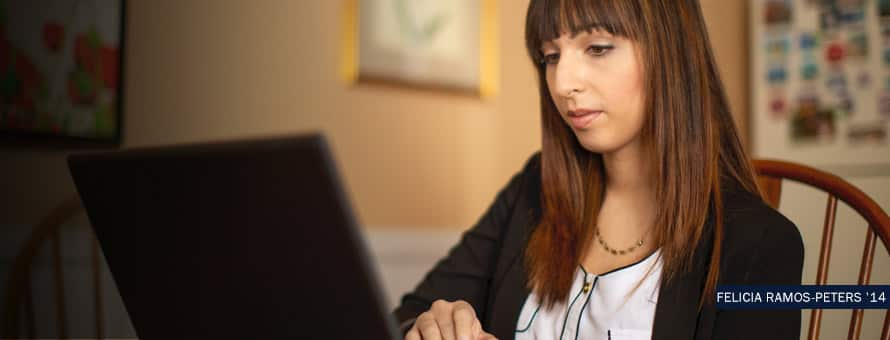
Online MFA in Creative Writing Master of Fine Arts
Earn an MFA in Creative Writing Online
- $637/credit (48 credits total)
- Transfer up to 12 graduate credits
- 100% online – no residency required
- Four fiction genres to choose from
- Career-focused certificate included
- No application fee or GRE/GMAT scores required
Online MFA in Creative Writing Program Overview
Share your story with the world and let the power of storytelling take your career to new heights with an online Master of Fine Arts (MFA) in Creative Writing . As one of the only programs available that encourages a focus on genre fiction, our online MFA lets you hone your craft in an area specific to your strengths and interests. You'll also learn about the business side of creative writing, preparing you to market your work in the real world.
While most MFA programs require a residency, Southern New Hampshire University's online MFA in Creative Writing can be completed entirely online, with no travel necessary.
“Traditional MFA programs, whether full-time or low residency, are out of reach for many writers,” said Paul Witcover , associate dean of creative writing. “The SNHU online MFA was designed to make the MFA experience accessible to all fiction writers, opening the door to diverse voices excluded for too long from the literary conversation. Our program is dedicated to giving writers the tools to succeed on the page and beyond it.”
Graduates leave the program with a completed and revised novel in one of our four offered genres: Contemporary, Young Adult, Romance and Speculative. With the included certificates in either online teaching of writing or professional writing , you'll have the skills to support your writing career, no matter where it takes you.
.st0{fill:#21386D;} What You'll Learn
- The business and technical sides of professional writing
- How to navigate the publishing ecosystem, identify agents and editors, and market your work to appeal to decision-makers
- Using social media to gain a following and build your brand
- How to teach writing in a classroom setting
.cls-1 { fill: #21386d; } How You'll Learn
At SNHU, you'll get support from day 1 to graduation and beyond. And with no set class times, 24/7 access to the online classroom and helpful learning resources along the way, you'll have everything you need to reach your goals.

The Value of an Online MFA
Emily Jones ’20 embraced a transformational experience through the online MFA in Creative Writing program, which supported her in taking her writing career to the next level. “I can now say, without even a hint of imposter syndrome, that I am a writer,” said Jones. “And that is because of Southern New Hampshire University.”
Career Outlook
According to the U.S. Bureau of Labor Statistics, writers and authors made a median annual salary of $69,510 in 2021, while editors made $63,350. 1
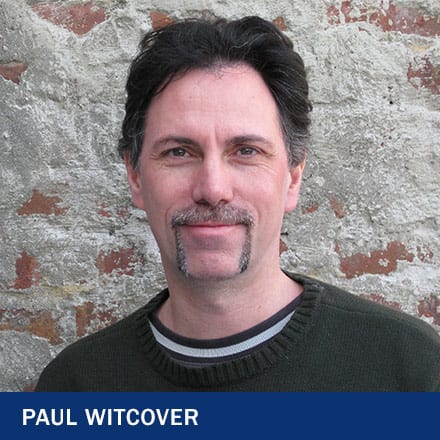
“Our mission is to give students a degree and associated practical skills they can use to forge successful pathways in academia, business, or by blazing their own career trail,” said Paul Witcover , associate dean of creative writing.
Earning one of the included certificates in online teaching of writing or professional writing will also be an invaluable addition to your resume for part-time, full-time and freelance jobs in a variety of fields, including:
- Higher education. Instruct writing courses in higher education settings. In 2021, postsecondary teachers made a median annual wage of $79,640, and you can expect to see a 12% growth in available positions through 2031, according to the BLS. 1
- Advertising. Use your storytelling skills in a way that influences consumer action. As a copywriter, you could find yourself doing any number of writing projects from crafting emails and ads to writing entire commercials.
- Marketing. If you're more comfortable with long-form prose, many businesses have invested in content writers who create quality content such as blog posts, ebooks and podcasts to attract and retain customers.
- Entertainment. Good at building suspense or setting up punchlines? From movies and plays to comedy and podcasts, being a good storyteller and writer is important to finding success in the entertainment industry.
- History. Every person's life has a plot, but it takes writers like you to tell their stories in a compelling way. Help readers relive the experiences of historic figures and pop culture icons as a biographer.
Higher Education
Instruct writing courses in higher education at a college or university, either in-person or online.
Advertising
Influence consumer action through copywriting, from print ads to digital advertising and broadcast commercials.
Create written content such as blog posts, ebooks and podcasts to attract and retain customers.
Entertainment
From movies and plays to comedy and podcasts, writers often find success in the entertainment industry.
The U.S. Bureau of Labor Statistics (BLS) predicts favorable job growth in postsecondary education. And while statistics are not available for all job settings mentioned above, the BLS reports the following:
.cls-1 { fill: #21386d; } Job Growth
The BLS predicts an 8% growth in available postsecondary teaching positions through 2032. 1
.cls-1 { fill: #21386d; } Potential Salary
Writers and authors made a median annual salary of $73,150 in 2022, while editors made $73,080 and postsecondary teachers made $80,840. 1
Understanding the Numbers When reviewing job growth and salary information, it’s important to remember that actual numbers can vary due to many different factors — like years of experience in the role, industry of employment, geographic location, worker skill and economic conditions. Cited projections do not guarantee actual salary or job growth.
Start Your Journey Toward an Online MFA in Creative Writing
If you're looking to earn your Master of Fine Arts online, you've found the right program. Even though there are no residency requirements, you'll still interact frequently with other students and faculty members in asynchronous discussions, critique workshops and within our online writer’s community, where students come together to share industry news, extend writing tips and develop critique partnerships.
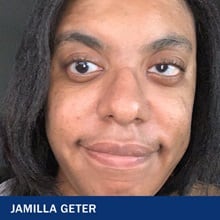
"I liked MFA-514 (Advanced Studies in Genre Literature) best," said student Jamilla Geter . "It was a great look into the different genres. It really helped me narrow down what genre I wanted to write in."
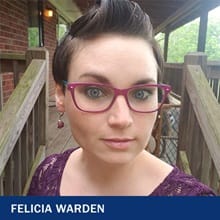
"Though it was not writing exactly, its connection to it – especially in our digital world – was made clear almost immediately," she said. "Writing is not just providing content of value to your readers, but also creating avenues of access so those readers can find your content. This course helped me to understand that and to learn how I can create those avenues."
Besides allowing you to focus on your own creative interests, part of our 48-credit online MFA curriculum requires you to choose from 2 certificate offerings designed to round out your education and better prepare you for a multitude of writing-related careers.
The first choice is a Graduate Certificate in Online Teaching of Writing , which is tailored to those who see themselves teaching in an online classroom setting as a supplement to their writing careers. Students practice approaches to editing and coaching, learning how to establish a virtual instructor presence and cultivate methods for supporting and engaging students within online writing communities.
Learn more about the online teaching of writing graduate certificate .
Students can also choose the Graduate Certificate in Professional Writing , which highlights the technical and business opportunities available to writers. Students will develop a range of skills, such as copywriting, social media, marketing principles and/or content generation, learning many of the freelancing skills integral to today’s project-driven economy.
Learn more about the professional writing graduate certificate .
All of our courses are taught by accomplished authors and industry professionals who know both the craft and business of creative writing. They will work closely with you to develop both your creative and professional skill set.
"All instructors within my program were extremely knowledgeable and helpful," Warden said. "I learned a lot about the different career paths my instructors chose. ... The course instruction, along with their anecdotal experiences, helped in offering knowledge in different areas of our field.
MFA Program Thesis
The thesis for the Online MFA in Creative Writing is required to be a novel of at least 50,000 words in one of the four genres the program offers: Contemporary, Young Adult, Romance, and Speculative.
Every Southern New Hampshire University online MFA student who graduates from the program will do so with a revised novel manuscript in their chosen genre, which is completed in a three-course thesis series. Throughout your tenure in the program, you can either work on a singular idea that you will develop during the three thesis courses, or you can begin a new project for your thesis. You can also combine elements of the four genres offered in the program for your thesis. For example, your thesis might be a YA Speculative Fiction novel.

"My three thesis classes for the MFA degree were the most helpful," said Kathleen Harris '21 . "I was actually writing a book as my thesis, so it was both enjoyable and advantageous for the degree. And it was the end of a very long milestone of accomplishments."
| View Full Curriculum in the Catalog |
|---|
| Courses May Include | ||
|---|---|---|
| MFA in Creative Writing Online | ||
| MFA 505 | Introduction to the Online MFA | Explore a unique culture and approach to fiction writing at SNHU that embraces practicality, diversity and community. Understand the history and major categories of genre fiction, including the role genre plays for readers, writers, and publishers. Develop techniques for effective workshopping. Discover habits and behaviors that support the creative process and forge ties with a peer and faculty community that support a rewarding writing career. |
| MFA 507 | Advanced Studies in Literature | Study classic and contemporary literature by exploring published authors' usage of creative writing craft elements. Analyze the applications of these storytelling craft elements in published literature, and identify why the literature, as a cohesive whole, is successful. Develop individual approaches to the "writer's toolkit," by employing the craft elements of storytelling into personal works for advancing a career as a creative writer. |
| MFA 509 | Storytelling | Analyze and practice fundamentals of storytelling, including narrative arc, plot, and character development. Deconstruct popular stories in literature and film to understand characteristics of beginnings that hook, tension-building middles and satisfying endings. Refine and polish an original premise through workshop and reflection. Apply techniques to your own stories. |
| MFA 514 | Advanced Studies in Genre Literature | Cultivate an appreciation for several literary genres through the study of various important works, authors, key historical developments, characteristic tropes, and conventions. Prepare for upcoming cross-genre creative writing workshops. Analyze one genre novel for how it fits within the literary landscape in preparation for genre concentration selection. Research market trends to gain a practical grasp of how a genre's history continues to influence popular books today. |
| MFA 600 | The Publishing Ecosystem | Follow the journey of publication from initial manuscript submission to a finished book in a reader's hands. Investigate business models and key roles in the publishing world, learn conventions of submission, and identify networking opportunities. Research the critical organizations, communities, and industry publications and resources unique to a chosen genre. |
| MFA 602 | The Business of Writing | Explore the many methods and strategies that professional writers employ to leverage their creative talents into financially sustaining work. Investigate the many types of writing opportunities available beyond book publishing, and learn how to start and grow a successful freelance business. Research freelance opportunities, learn how to manage a sole proprietorship, and find resources about various industry tools and conventions. |
| MFA 604 | Finding and Reaching an Audience | Develop strategies to find a readership and build an audience. Investigate approaches and tools for building a writer's platform and increasing visibility in a chosen market. Create a customized, multi-faceted plan to cultivate and engage new fans. |
| MFA 606 | Copy and Content Writing | Target a specific readership by applying copywriting and content writing skills. Learn how to write effectively and persuasively for marketing purposes, particularly when crafting book descriptions or book marketing materials, social media posts, email newsletters, and other types of copy. Focus on producing effective headlines and content for search engine optimization purposes. |
| MFA 608 | Editing and Coaching | Define and practice the types of editing and examine their use at different stages of revision. Become familiar with methods of revision and editing in order to apply them to one's own writing and that of their clients. Explore the role of the editor-as-coach, and practice a coaching approach to editing. Learn strategies for building an editing and coaching clientele. |
| MFA 700 | Thesis Writing I | Begin to develop the novel that serves as a thesis for the MFA program. Build a detailed plan that documents the writing process and prepares next steps to be taken toward novel completion. Engage in constructive workshopping, and reflect both on one's place within a literary community and on how one's work fits within the publishing ecosystem. Cultivate self-confidence and practical outreach skills by preparing and presenting an effective "elevator" pitch of a novel. |
| MFA 701 | Thesis Writing II | Continue writing a publication-ready novel following a detailed writing plan toward the completion of a full draft. Work to hone creative craft and critical abilities using constructive workshopping, engaging with peers in productive feedback processes. Develop practical strategies for improving work through revision. |
| MFA 702 | Thesis Writing III (Capstone) | Revise, finalize, and submit a publication-ready novel for the capstone in the MFA program. Assemble a professional portfolio including a query letter and synopsis, accumulated evidence of writing work, and a personally branded website. Reflect critically on one's place within a writing genre, examine influential books and writers, and envision a career in writing in the context of literary citizenship. Demonstrate mastery of program outcomes through a satisfactory/unsatisfactory grade evaluation. |
| Total Credits: 48 | ||
Minimum Hardware Requirements Component Type PC (Windows OS) Apple (Mac OS) Operating System Currently supported operating system from Microsoft. Currently supported operating system from Apple. Memory (RAM) 8GB or higher 8GB or higher Hard Drive 100GB or higher 100GB or higher Antivirus Software Required forcampus students. Strongly recommended for online students. Required forcampus students. Strongly recommended for online students. SNHU Purchase Programs Visit Dell Visit Apple Internet/ Bandwidth 5 Mbps Download, 1 Mbps Upload and less than 100ms Latency 5 Mbps Download, 1 Mbps Upload and less than 100ms Latency Notes: Laptop or desktop? Whichever you choose depends on your personal preference and work style, though laptops tend to offer more flexibility. Note: Chromebooks (Chrome OS) and iPads (iOS) do not meet the minimum requirements for coursework at SNHU. These offer limited functionality and do not work with some course technologies. They are not acceptable as the only device you use for coursework. While these devices are convenient and may be used for some course functions, they cannot be your primary device. SNHU does, however, have an affordable laptop option that it recommends: Dell Latitude 3301 with Windows 10. Office 365 Pro Plus is available free of charge to all SNHU students and faculty. The Office suite will remain free while you are a student at SNHU. Upon graduation you may convert to a paid subscription if you wish. Terms subject to change at Microsoft's discretion. Review system requirements for Microsoft 365 plans for business, education and government. Antivirus software: Check with your ISP as they may offer antivirus software free of charge to subscribers. if (typeof accordionGroup === "undefined") { window.accordionGroup = new accordion(); } accordionGroup.init(document.getElementById('f756dce5bd874c61855f6f6e92d88470')); University Accreditation

Tuition & Fees
Tuition rates for SNHU's online degree programs are among the lowest in the nation. We offer a 25% tuition discount for U.S. service members, both full and part time, and the spouses of those on active duty.
| Online Graduate Programs | Per Course | Per Credit Hour | Annual Cost for 15 credits |
|---|---|---|---|
| Degree/Certificates | $1,911 | $637 | $9,555 |
| Degree/Certificates (U.S. service members, both full and part time, and the spouses of those on active duty)* | $1,410 | $470 | $7,050 |
Tuition rates are subject to change and are reviewed annually. *Note: students receiving this rate are not eligible for additional discounts.
Additional Costs: Course Materials ($ varies by course). Foundational courses may be required based on your undergraduate course history, which may result in additional cost.
Frequently Asked Questions

Academic Spotlight: Liberal Arts Associate Dean Paul Witcover

6 Ways to Improve Your Communication Skills at Work

Is a Communication Degree Worth It?
Related programs.
Creative Writing Master of Fine Arts Degree
You are here: american university college of arts & sciences literature master of fine arts in creative writing.
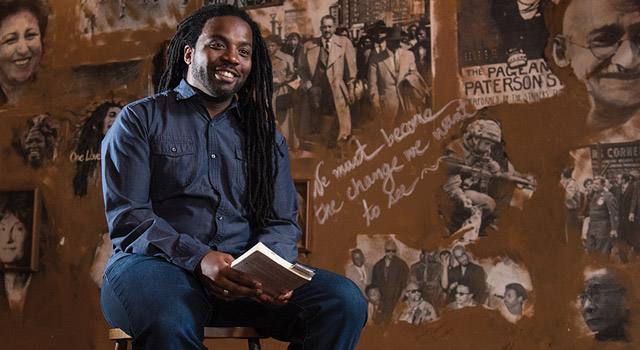
- Request Info
Are you interested in…
Explore more.
Are you interested in...
202-885-2971
Battelle Tompkins, Room 237 on a map
Back to top
Hone Your Craft in the Capital City
For more than 30 years, writers have come to American University to develop their work and exchange ideas in the District’s only creative writing MFA program. Our graduate workshops provide a rigorous yet supportive environment where students explore a range of approaches to the art and craft of fiction, nonfiction, and poetry.
As an MFA student at American, you are free to pursue a single genre or explore several. You will acquire a deeper understanding of your own work and hone your skills in a collaborative setting.
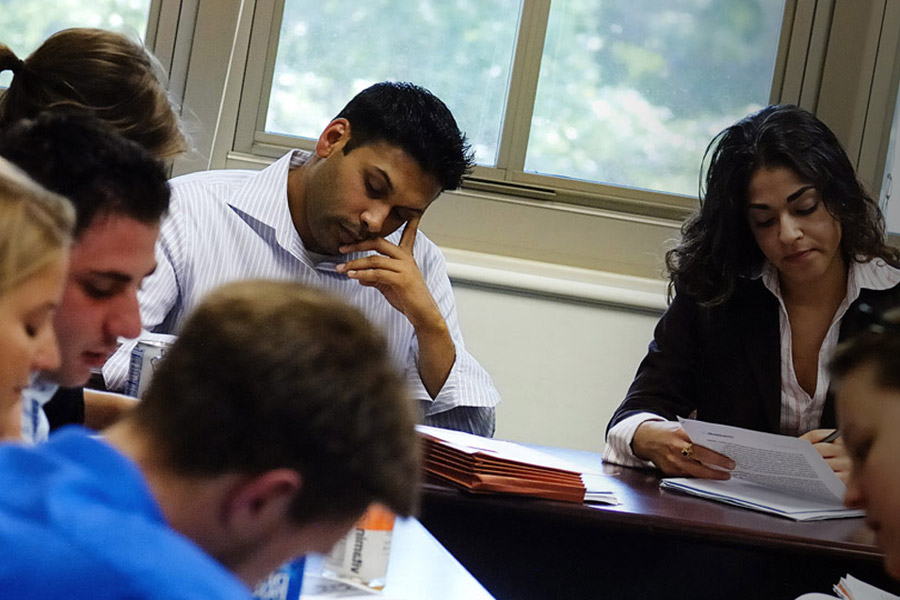
A Program of Study That Gets Results
This two-year, 36-credit-hour MFA program integrates writing, literary journalism, translation, and the study of literature to prepare students for a range of career possibilities. Write, give feedback, and receive guidance from a close-knit community of respectful peers and faculty. In the MFA program, you'll find lawyers, military veterans, musicians, teachers, and business executives who are passionate about the written word.
Connect with accomplished professors and the resources you need to reach your goal. Our faculty members have been featured in a variety of media and publications including the New Yorker , the New York Times , National Public Radio, Bill Moyers & Co., and the Washington Post.
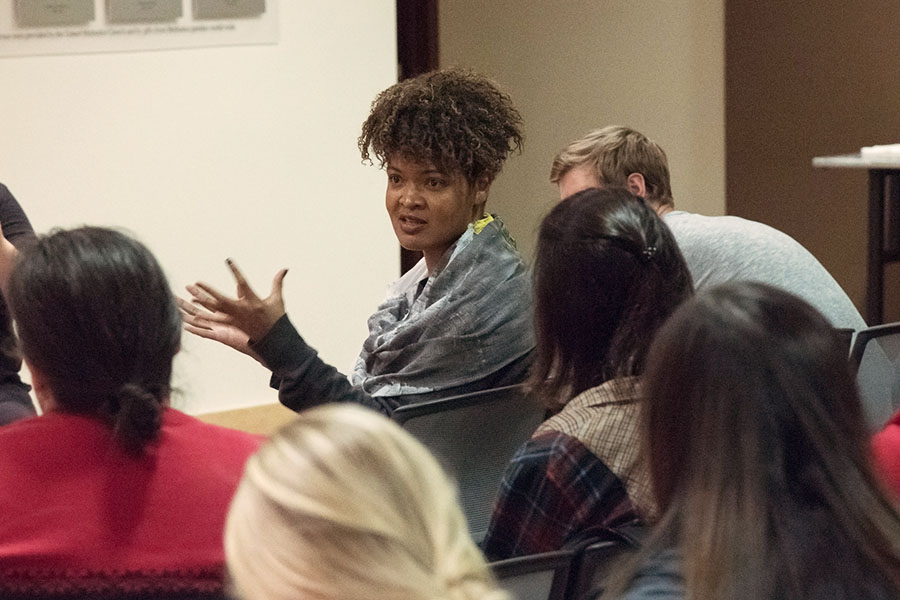
Prominent Authors Dedicated to Your Success
Our faculty of award-winning poets, novelists, translators, and nonfiction writers will help you help you hone your craft and pursue your career as a writer. You will receive instruction and guidance from successful authors published by university presses and major publishers, including Houghton Mifflin, Scribner, Vintage Books, Viking Press, and WW Norton. Our active and engaged faculty members are regularly featured in top media outlets such as The New York Times, New Yorker, Washington Post, Chicago Tribune, and New Republic ; in literary journals like Kenyon Review, Ploughshares, and Shenandoah ; and on television and radio.
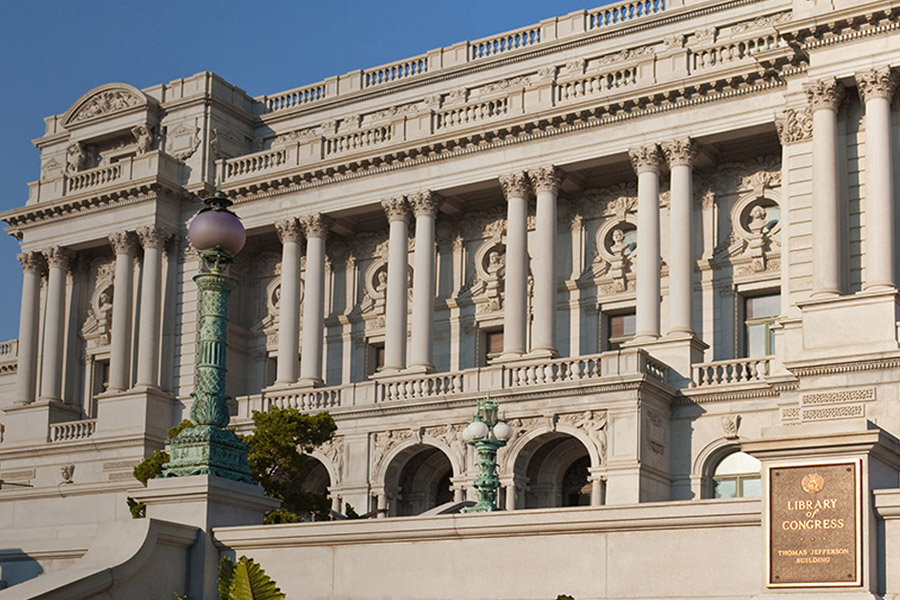
A City For Writers
Living and learning in the nation's capital provides numerous benefits for MFA students. We partner with organizations like the National Endowment for the Arts, Library of Congress, 826DC, Writopia Labs, and Folger Shakespeare Library to facilitate opportunities for our students.
Our students have recently published books with WW Norton, Copper Canyon, University of Wisconsin Press, and MIT Press. They have been featured on This American Life , Poets & Writers , in Creative Nonfiction , Psychology Today , and more.
We Know Success
97% of graduates are employed, in grad school, or both 6 months after graduation.
Our alumni have gone on to work for organizations including:
- Catalogue for Philanthropy: Greater Washington
- EEO ClassIn
- Fulbright Association
- Goodwin University
- PEN/Faulkner Foundation
- Shout Mouse Press
- Street Sense Media
- The Building People
- W. W. Norton & Company, Inc
Publications
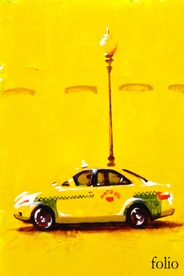
Folio is a nationally recognized literary journal sponsored by the College of Arts and Sciences at American University in Washington, DC. Since 1984, we have published original creative work by both new and established authors. Past issues have included work by Michael Reid Busk, Billy Collins, William Stafford, and Bruce Weigl, and interviews with Michael Cunningham, Charles Baxter, Amy Bloom, Ann Beattie, and Walter Kirn. We look for well-crafted poetry and prose that is bold and memorable.
News & Notes
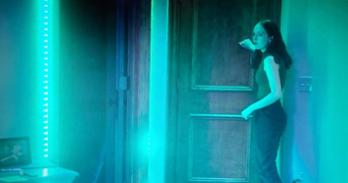
Bringing Child Predators to Justice: The Work of Poet Jordan Pérez
Recent award-winning publications by our MFA alumni :
- Valzhyna Mort won the 2021 International Griffin Prize for her third poetry collection, Music for the Dead and Resurrected (FSG, 2020), which was named one of the best poetry books of 2020 by The New York Times.
- Field Study by Chet’la Sebree won the 2020 Academy of American Poets James Laughlin Award; Mistress won the 2018 New Issues Poetry Prize.
- "The Niece" by Yohanca Delgado was selected for the Distinguished Stories list in Best American Short Stories 2020 .
- Trouble Sleeping by Abdul Ali won the 2014 New Issues Poetry Prize.
- Daydreamers by Jonathan Harper was named a Kirkus Indie Books of the Month Selection.
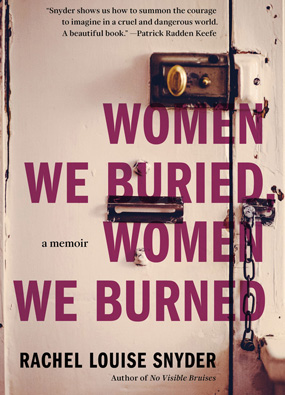
Rachel Louise Snyder recounts how her mother’s death left her unmoored and untoward in her new memoir .
Kyle Dargan served as editor for The Memory Librarian: And Other Stories of Dirty Computer with Janelle Monáe.
Dolen Perkins-Valdez (Literature) won the 2023 NAACP Image Award for fiction for her most recent novel, Take My Hand .
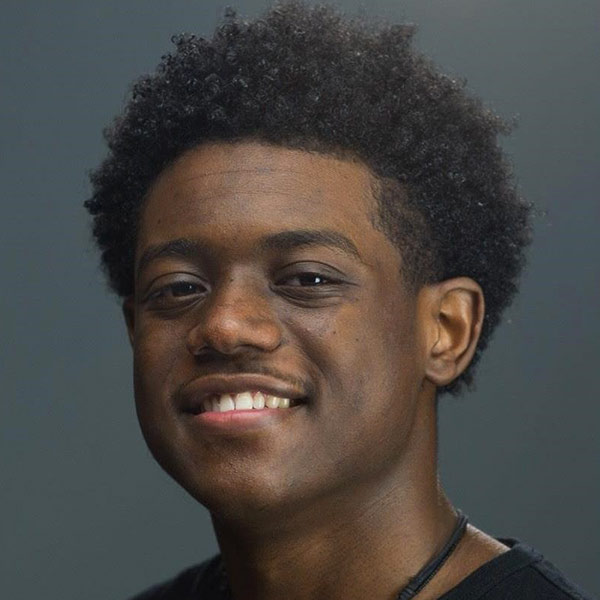
Ralvell Rogers MFA, Creative Writing
More about ralvell.
MFA Creative Writing candidate Ralvell Rogers is making his mark on the literary world.
My time at AU has been brilliant in the fact that I've already learned much about what it means to be a Writer with a capital "W" and more importantly, a literary scholar. Though there is an obvious focus on our course work, it's been made clear to me that our work isn't exactly all that matters in the classroom. We are continuously connecting our work in class to the lives that we live on a daily basis and the world that we all live in, and I think that is very important for writers and entrepreneurs in the publishing sector because we are essentially the historians of our respective generations.
He is the author of The Kansas City Boys Choir: Providing Hope for Tomorrow , which has been endorsed by luminaries Kevin Powell, G.S. Griffin, and Congressman Emanual Cleaver II. Ralvell has also established his own publishing company, Ambitious Stories, LLC, out of Kansas City, MO. He founded it earlier this year to focus on "often unheard, yet riveting and inspiring stories from the heart."
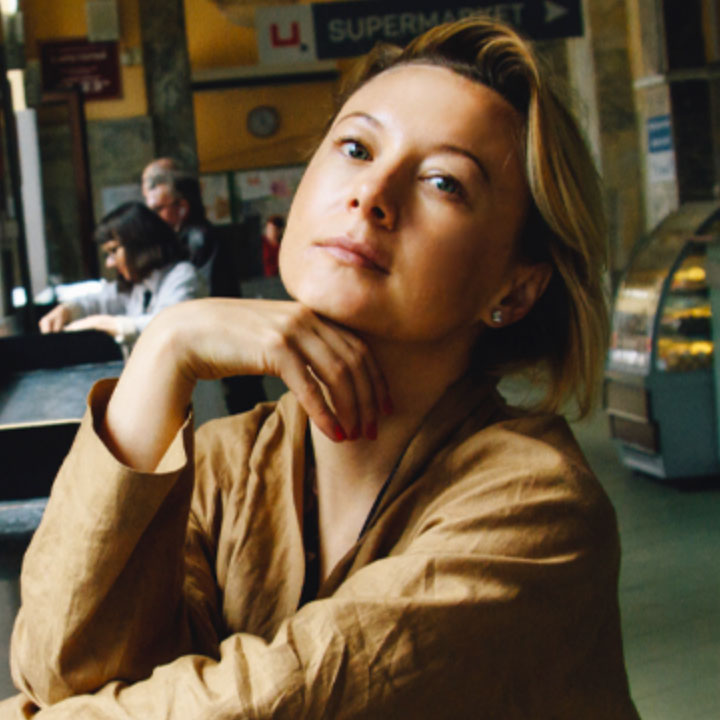
Valzhyna Mort MFA Creative Writing
More about valzhyna.
Alumna Valzhyna Mort has gained international acclaim for her third poetry collection, Music for the Dead and Resurrected (FSG, 2020), which won the 2021 International Griffin Prize and was named one of the best poetry books of 2020 by the New York Times . Publishers Weekly called this work in their starred review, "poems of reclamation and resurrection; to live in them is to confront the hard work of witness." The New Yorker wrote in its review, "Memory, metaphor, and myth intermingle to sometimes nightmarish effect in this collection by a Belarus-born poet. Mort excavates the individual and communal traumas wrought by a violent and repressive national history, and calls herself 'a test-child exposed to the burning reactor of my grandmother’s memory.'" Mort teaches poetry, literature, and translation at Cornell University.
Look inside the Creative Writing MFA
For more than 40 years, writers have come to American University to develop their work and exchange ideas in the District’s only creative writing MFA program.
Frequently Asked Questions
What is the application deadline for a merit award.
The application deadline is February 1. All applications are automatically considered for merit awards. After February 1, the program continues to consider applications, but cannot guarantee those applicants will be considered for merit awards.
What is the MFA thesis?
The required MFA thesis consists of an original, book-length manuscript. It may be a novel, a novella, a memoir or collection of stories, creative nonfiction, or poems. The thesis is due approximately a month before the end of the student's final semester.
How long does it take to earn the MFA degree at American University?
Most students complete the 36-credit degree in 2 years. Full-time study is 9 credits (3 classes) per semester. Others pursue their degree part-time, taking 1-2 classes per semester as best fits their schedules. All workshops, and many literature courses, are offered at night, so that students with full-time jobs can still complete their coursework.
What does the admissions committee look for in an applicant's writing sample?
The committee regards the writing sample as the most important part of the application. It's therefore important that you pay close attention to the manuscript guidelines (see below). Send what you feel is your strongest work that shows your demonstrated talent. It is not important to the committee whether or not work has been previously published.
Those submitting applications in poetry should send no more than 12 poems or 15 pages (with no more than one new or continuing poem per page). If submitting fiction/nonfiction, please submit 15-25 pages. While the catalog calls for a 25-page writing sample, we value quality over quantity. We are interested in seeing only your very best work, which can consist of one or more stories or works of creative nonfiction or an excerpt from a novel. If you send an excerpt from a novel, please include a brief description of the work as a whole.
Still have questions? Email [email protected] .
Please send me information about Master of Fine Arts in Creative Writing
It looks like you already used that name and address to request information for one or more AU graduate program(s).
If you have not previously requested AU graduate program information, create a new request

IMAGES
VIDEO
COMMENTS
Whether you studied at a top creative writing university or are a high school dropout who will one day become a bestselling author, you may be considering an MFA in Creative Writing. But is a writing MFA genuinely worth the time and potential costs?
Find information about more than two hundred full- and low-residency programs in creative writing in our MFA Programs database, which includes details about deadlines, funding, class size, core faculty, and more.
Liberty’s 100% online Master of Fine Arts (MFA) in Creative Writing can help you develop your writing passion into a career so you can set your works free to impact culture and the world.
Share your story and advance your career as a creative writer by earning an online MFA in creative writing degree from affordable, accredited SNHU.
Spanning two years, a master of fine arts (MFA) program trains you to become a skilled writer, communicator, and editor who can receive and apply feedback effectively. This adaptable skill set enables you to work in industries like education, publishing, and journalism.
What Is a Low-Residency MFA In Creative Writing? There are three different types of MFA in Creative Writing programs: a traditional MFA, a low-residency MFA, and an online MFA. A traditional MFA takes two to three years and is completed entirely in person.
The Master of Fine Arts (MFA) in Creative Writing degree offered by Drexel University Online provides students with the skills necessary to enhance their craft, forge professional networks and succeed in careers as writers.
This two-year, 36-credit-hour MFA program integrates writing, literary journalism, translation, and the study of literature to prepare students for a range of career possibilities. Write, give feedback, and receive guidance from a close-knit community of respectful peers and faculty.